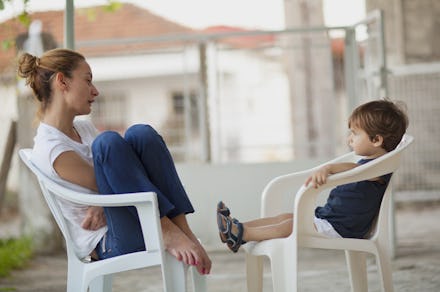This Study Will Make You Rethink the Way You Talk to Children

The news: Kids might benefit more from a bedtime conversation than a bedtime story. A recent study found the quality and conversational context of the words a child hears during the first three years of their life are more important in developing language skills and cognitive abilities than the number of words.
While the researchers noted the quality of the words was important, they also said context was crucial.
"It's not just about shoving words in," Kathryn Hirsh-Pasek, the study's lead author, told the New York Times. "It's about having these fluid conversations around shared rituals and objects, like pretending to have morning coffee together or using the banana as a phone. That is the stuff from which language is made."
30 million reasons why this matters: A 1995 study found that children of affluent families hear, on average, 30 million more words in the first three to four years of their lives than children of low-income families. The study concluded this "30 million-word gap" created a disparity from which the low-income children would never recover, and that would only increase in size as the children turned into adults.
A study from 2013 reiterated these findings and even found that the "30 million-word gap" starts affecting children even earlier than the 1991 study suggested. The most shocking revelation in the 2013 study was that by the time a low-income child starts school at 5 years old, they are more than two years behind their privileged counterparts in language development.
Solutions on the horizon: Cities and states are developing ways to help close this gap. Providence, Rhode Island, created a program called Providence Talks, where families sign up to receive a free "word pedometer," a device that "filters out television and background noise and develops a comprehensive picture of a child's daily auditory environment." Participants also get a biweekly coaching visit so parents can develop a strategy for working with their children at home.
Ultimately, the responsibility is on parents to treat their babies as tiny adults, at least as far as conversation and word choice go.